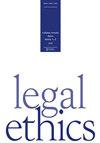Collaborative Law: an (un)ethical process for lawyers?
IF 0.3
Q1 LAW
引用次数: 2
Abstract
ABSTRACT This article critically examines the practice and ethical underpinnings of Collaborative Law (CL), one of the newest processes in the ADR suite of options available to parties in dispute. CL has been described as mediation without the mediator. The parties and their lawyers agree to negotiate in good faith and in a cooperative non-adversarial manner without the assistance of a mediator. However, controversially, they also agree that if settlement is not reached, the lawyers are to withdraw and be disqualified from representing the parties in any subsequent litigation. The parties must engage new lawyers and often new expert witnesses if they wish to proceed with litigation. In this article, the author highlights the potential for CL lawyers to exert undue pressure on their clients as the goal of settlement is given priority over the interests of the clients. The article describes the main features of CL, its contractual supports, its potential benefits and the potential for its abuse.合作法:律师的(非)道德过程?
摘要本文批判性地研究了合作法的实践和伦理基础,合作法是纠纷各方可选择的ADR套件中的最新程序之一。CL被描述为没有调解员的调解。双方当事人及其律师同意在没有调解人协助的情况下,本着诚意,以合作而非对抗的方式进行谈判。然而,有争议的是,他们也同意,如果不能达成和解,律师将退出,并被取消在任何后续诉讼中代表当事人的资格。如果当事人希望继续诉讼,就必须聘请新的律师,而且往往需要新的专家证人。在这篇文章中,作者强调了CL律师对其客户施加不当压力的可能性,因为和解的目标优先于客户的利益。本文介绍了CL的主要特点、合同支持、潜在利益和滥用的可能性。
本文章由计算机程序翻译,如有差异,请以英文原文为准。
求助全文
约1分钟内获得全文
求助全文

 求助内容:
求助内容: 应助结果提醒方式:
应助结果提醒方式:


